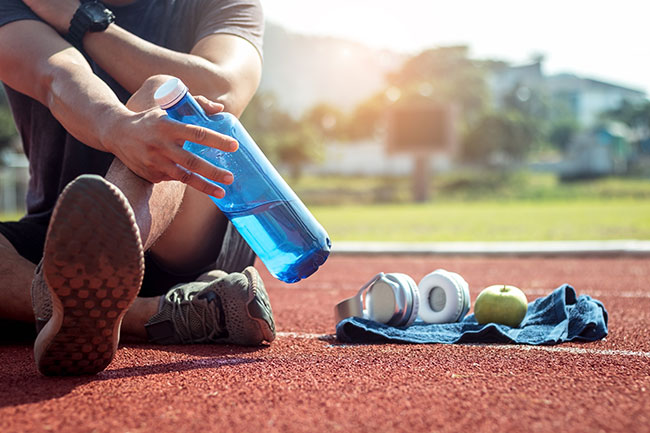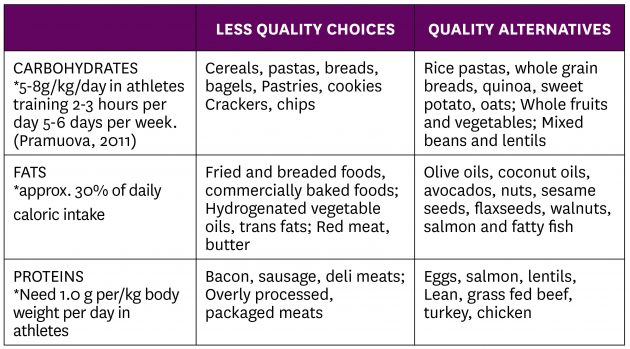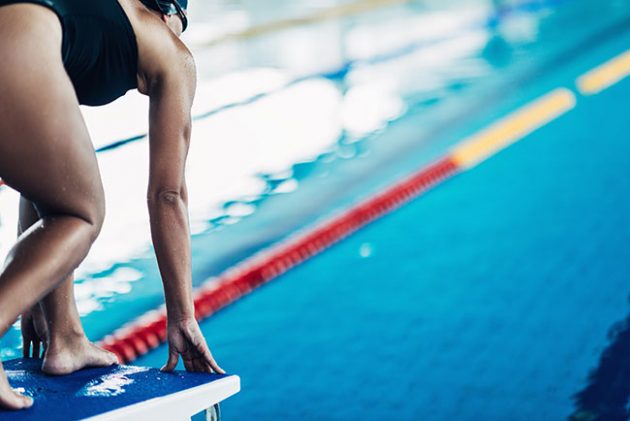
A strong foundation: Fuelling the athlete’s immunity and performance
By Dr. Ashley Nelson, ND
Features Photo: © SMEEitz / Adobe Stock
Photo: © SMEEitz / Adobe Stock A healthy immune system is more important than ever. While the research is still limited, there is emerging evidence for the role of a healthy baseline in the prevention and recovery from COVID-19. Select nutrients have been established for prevention and reduction of severity of illness, including vitamin D and zinc. The role of healthy diet, exercise, social support and mental wellness have also been highlighted. How is this relevant to the athlete?
The pandemic demonstrates the importance of a good baseline for illness prevention. It does not guarantee we are exempt from getting sick, but it promotes the role of overall health and nutrition when it comes to illness prevention.
While performance and sport specific development is the primary focus for most athletes, health optimization is critical. The better overall health an athlete is in, the more resilient they will be. More resiliency will lead to less missed practices and games, improved mindset, faster recovery, and allow athletic performance and development to be more efficient and effective.
Nutrition
What, and when athletes eat, matters. Athletes require higher nutrient volume and density to meet their demands. Without proper nutrition as a cornerstone of health, the athlete will suffer not only in their immune function and performance potential, but also from possible long-term consequences as we see with the female athletic triad. This condition is highlighted by anovulation and osteoporosis as a result of disordered eating or poor nutritional intake. It exemplifies the damaging effects an unbalanced athletic wellness plan can lead too.
Carbohydrates, proteins, and fats are fundamental macronutrients to assess in an athlete. While the macro proportions required may vary between athletes and training status, quality is an unchanged factor important for this population.
Nutrition timing
An athlete may be eating all the right things, but if the timing is not optimized, there may be room for improvement.
Post-exercise requirements: In the few hours following exercise, we have the opportunity to push the body from a catabolic breakdown and burn state to an anabolic build and repair state. We also need to replace fluids, replace the glycogen stores used by active muscles, repair damaged tissue, and support immune function.
Carbohydrate intake should start as soon as possible and be the first priority. Ideally within a 30-minute to two-hour window. This consumption can improve endurance, especially when paired or followed by protein. Skipping this window, an athlete can present with fatigue, intense hunger, or increased cravings following exercise. It is recommended that 1-1.2 grams carbohydrate per kg of body weight is consumed for immediate recovery following exercise.
This window is to be followed by a more well-rounded meal, featuring protein.
Blood sugar regulation: Avoidance of hypoglycemia or blood sugar crashes is important. Frequent meals with protein at each serving helps slow the release of sugar into the blood stream. This lessens the speed of insulin response, and thus the crash of blood sugar. When meals are skipped, or there is an over reliance on quick release carbohydrates as a primary fuel, blood sugar crashes and reactive hypoglycemic episodes may occur. These drops can lead to lower functioning immune system, fatigue, anxiety, irritability, and lower adherence to more balanced dietary recommendations.
Hydration
Ensuring a well hydrated athlete is key to performance and overall wellness. Dehydration can contribute to lower cardiovascular function creating more challenge with performance, exertion, concentration, and physical capacity. (Murray, 1995). Thirst, dry mouth, sunken eyes, weakness, dizziness, low urine output, increased skin tenting, and cramps can be signs and symptoms of dehydration. Caffeine use, while it can aid athletic performance, it can also perpetuate fluid loss. Increased sweating, body weight, climate/environment, and genetics are other factors.
To stay hydrated, it is recommended that 400-800 ml/hour during training can be a good starting point for athletes. (Coyle, 2004).
Electrolytes may be important if the athlete is performing for longer than 90 minutes. This may be more important for athletes experiencing lightheadedness, hunger, or fatigue that cannot otherwise be explained. Electrolytes can help increase fluid absorption and retention, and replace salt in athletes requiring it. Many commercial drinks contain higher glucose, so sometimes tablets or professional grade powder replacements offer a good alternative.

Rest
Rest is a foundational requirement for our health. It is an underemphasized tool at everyone’s immediate disposal. It is a time of repair, cortisol lowering, hormone balancing, and a general mental reset. Proper rest involves breathing, low external stimulation, gentle movements, and activities that support the above physiological processes. Improper rest involves Internet scrolling, T.V. binges, or overuse of alcohol or other mind-altering substances. These more recreational activities do little to restore our parasympathetic response and may even trigger more of stress response, completely counter to the intention. Athletes may require a push for this downtime when schedules are particularly demanding.
Select nutritional needs of an athlete
Certain nutrients can provide added benefit at times of higher demand. The more demand we have, the more fuel we require. Lack of replenishment will lead to worse outcomes in performance, but also increase burnout, and risk of illness.
Stress, whether that’s physical, or mental, depletes nutrients. Overtraining, endurance sports, and consistently high intensity training with weights or cardio can push our bodies too far biochemically. High stress can lead to all sorts of negative health concerns like inflammation, thyroid issue, mood changes and so on, and the stress induced by exercise is not exempt.
In times of elevated stress or demands, it can be worth considering the implementation of key nutrients that will benefit performance, immunity, and restore potential stressed-induced depletions. These include:
- Vitamin C: It has been shown that vitamin C is depleted in an overly sympathetic state. Vitamin C is best absorbed in divided doses at or under 1,000 mg. Bowel tolerance testing can be used to better estimate the most correct dose for the athlete. Vitamin C is required when fighting infection. It is also required for ligament and tissue repair, playing an important role in injury repair.
- Magnesium: Magnesium is depleted by stress and high muscular demand. Further, when you consider that up to 75 percent of North Americans already do not get enough from their diet, it makes it a particularly important nutrient to consider. Glycinate forms tend to be better absorbed and important for muscular concerns of tension and pain.
- B12: Both oral or injectable B12 can be an important component of athletic performance, illness and injury recovery and prevention, as well as support energy demands.
If it is a high demand time for the athlete, with these cortisol raising exercises or training being required of the athlete, we can improve the overall balance by incorporating specific times of cortisol lowering activities. These include:
- Slow walking in nature. Athletes can make a routine of an after dinner walk. This will help lower cortisol levels before bed, allowing for additional nighttime rest.
- Deep breathing. As little as five minutes of deep breathing a day can restore balance in the parasympathetic and sympathetic nervous system. Athletes can incorporate this first thing in the morning.
- Yoga, gentle stretching, or tai chi: all of these will allow for cortisol lowering, as well as increased flexibility, control, and oxygenation to the muscles in high demand. Having an athlete incorporate one of these practices two times per week may largely benefit their outcome.
- Get adequate rest [as described above] and sleep during off times.
- Increase your nutrient intake, particularly quality carbohydrates and protein with added intensity training.

Photo: © Microgen / Adobe Stock
Getting sick, well
If the athlete does get sick, in addition to the basics like rest, hydration and some good nutrition, there may be a role for extra support:
Immune supportive supplements:
- Vitamin C: While vitamin C is a more popular option for immune health, studies have shown it may not have a great involvement in prevention of cold/flu. However, white blood cells that are activated during an immune response, require more vitamin C, so the added support from supplement or foods like citrus or strawberries may help you get better faster.
- Zinc citrate: Zinc is an immune modulator, anti-inflammatory, and antimicrobial. It may help prevent and treat common colds and flus.
- Vitamin D: there is an important role for vitamin D in immune health, and is particularly useful for prevention compared to other vitamin and supplement options. Lower blood serum levels of vitamin D are also correlated with various immune concerns, as well as other things like depression, fatigue, and bone concerns.
- Oil of oregano: a strong antimicrobial oil that can be combined with warm foods or soups. It can be taken on it’s own as well, but long term use is not ideal as it’s strong microbial action may kill off good bacteria.
- Herbal medicine: select herbs like ginseng, echinacea, astragalus and mushrooms such as cordyceps and reishi can have wonderful quality for immune support, improving energy and resiliency, and providing some preventative protection against colds and flus. These are best chosen by a trained ND or functional medicine practitioner in accordance with the individuals’ health history. They should be used with care given the strength and potential interactions of some herbal medicines.
The part cannot be separated from the whole. Reaching specific performance and skill goals may be delayed or prevented if the athlete is not living a well-balanced, health promoting life. We must strive for balance even when training and demands make this difficult. A more mindful approach to the athletes health will help short term goals along with supporting the athletes longevity both in sport and in life.
References
- Coyle, E.F. (2004).Fluid and fuel intake during exercise. Journal of Sports Sciences, 22:39R
- Murray, R. (1995). Fluid Needs in Hot and Cold Environments. International Journal of Sports Nutrition, 5, S62RS7355
- Pramuková, B., Szabadosová, V., & Soltésová, A. (2011). Current knowledge about sports nutrition. The Australasian medical journal, 4(3), 107–110.
Dr. Ashley Nelson is a Naturopathic Doctor practicing in Barrie, ON at Sports Medicine and Rehabilitation. She also offers virtual consultation for patients across Ontario. Mental health, hormones, and skin care are her areas of focus. Her treatments range from clinical nutritional plans and supplementation, to acupuncture, vitamin injectables, and motivational lifestyle counselling. To learn more, please visit: www.ashleynelsonnd.com.
Print this page